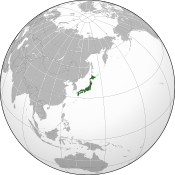Crisis at stricken Japan nuclear plant escalates to level of Chernobyl; six killed in aftershock
Tuesday, April 12, 2011

Image: United States Geological Survey.
The crisis at a stricken nuclear plant on the northeast coast of Japan is now as severe as the disaster at Chernobyl in 1986, officials have said. Radiation is continuing to leak from the plant, which was damaged during the devastating magnitude 9.0 earthquake and tsunami last month, which left thousands dead. Japanese authorities have warned the crisis is now a "major accident" with "wider consequences" than previously thought.
A spokesperson for NISA, the Japanese government nuclear authority, said officials had upgraded the crisis to a level seven on the International Nuclear Event Scale—the same applied to the Chernobyl disaster—because of a number of factors, including the detection of radiation in crops. "We have upgraded the severity level to seven as the impact of radiation leaks has been widespread from the air, vegetables, tap water and the ocean," he said.
| We have upgraded the severity level to seven as the impact of radiation leaks has been widespread from the air, vegetables, tap water and the ocean. | ||
—Spokesperson, NISA | ||
TEPCO, the operator of the plant, has warned radiation was continuing to leak from the site and the magnitude of the crisis could exceed that of Chernobyl. Despite this, Japanese nuclear safety officials have insisted the leakage of radiation was small compared to the devastated plant in the former Soviet Union. "In terms of volume of radioactive materials released, our estimate shows it is about ten percent of what was released by Chernobyl," one nuclear official said.

Image: DigitalGlobe.
(Image missing from Commons: image; log)
The news comes as a new blow after another powerful aftershock yesterday which left at least six people dead after they were killed in a mudslide in the city of Iwaki. The landslide, which destroyed numerous homes, was triggered by a magnitude 6.6 aftershock which came exactly a month after the 9.0 magnitude earthquake. Fire officials in the city said three people had already been rescued and taken to hospital, and emergency workers were working to free an unknown number of others.

Image: Silver Spoon.
Workers at the damaged Fukushima nuclear plant returned after they were briefly evacuated following the earthquake, and officials issued tsunami warnings for the northeast coast which were later cancelled. Workers have been fighting a desperate battle to prevent the reactors from overheating and entering meltdown. Raging fires burned into the night after the earthquake, and TEPCO reported widespread power outages; hundreds of thousands of homes and businesses had power cut off.
Reports of the change in severity at the damaged nuclear plant followed the announcement that the exclusion zone around the site was to be expanded. A spokesperson for the government confirmed the radius of the zone would be expanded to include another five communities over the next several weeks. He stressed there was "no need to evacuate immediately" but said concerns had been raised over health risks from the leaking radiation.
The new development at the plant and the aftershock are new blows to a country wounded after the massive earthquake in March, which caused a tsunami that washed away whole towns and villages along the country's northeast coast. Thousands of bodies have been recovered, and many more are still unaccounted for, many left under mounds of rubble or washed out to sea. More than 150,000 people remain displaced, living in emergency shelters.
| Through our own efforts and with the help of the global community, Japan will recover and come back even stronger. | ||
Before the aftershock struck yesterday, survivors of the first earthquake marked the time it hit a month ago with a moment of silence across the country. Writing to seven international newspapers, Naoto Kan, the Japanese prime minister, expressed his gratitude to people globally for their support. "Through our own efforts and with the help of the global community, Japan will recover and come back even stronger. We will then repay you for your generous aid," he wrote. "With this in our hearts, we now stand together dedicated to rebuilding the nation."
Sources
- Kenji Hall and John M. Glionna. "Japan raises nuclear crisis rating to highest level" — Los Angeles Times, April 12, 2011
- "Japan: Nuclear crisis raised to Chernobyl level" — BBC News Online, April 12, 2011
- "Strong Quake Hits Japan On One-Month Anniversary of Disaster" — Voice of America, April 11, 2011 (PUBLIC DOMAIN)
- "Japan: Powerful earthquake hits north-east" — BBC News Online, April 11, 2011
- "At least 6 killed in new Japan earthquake" — CNN, April 11, 2011
- "Evacuation widens as deadly aftershock rattles Japan" — CTV, April 11, 2011

